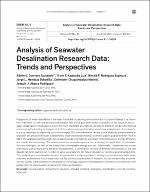| dc.contributor.author | Guerrero Escobedo, Adolfo Enrique | |
| dc.contributor.author | Azabache Liza, Yrwin Francisco | |
| dc.contributor.author | Rodriguez Espinoza, Ronald Fernando | |
| dc.contributor.author | Mendoza Bobadilla, Jorge Luis | |
| dc.contributor.author | Chuquimbalqui Marina, Delmester | |
| dc.contributor.author | Abarca Rodriguez, Joaquin José | |
| dc.date.accessioned | 2025-04-21T19:12:21Z | |
| dc.date.available | 2025-04-21T19:12:21Z | |
| dc.date.issued | 2025-04-21 | |
| dc.identifier.uri | https://hdl.handle.net/20.500.13067/3763 | |
| dc.description.abstract | Projections of water availability in the near future are increasingly worrisome due to climate change. It is, therefore, high time to seek and develop technologies that would guarantee water availability in the future. In this respect, desalination of seawater is one of the most important alternatives, as specific attention needs to be directed at improving the existing techniques of it. This is why updating information about new achievements for researchers is so important in improving such technologies. This comprehensive review article analyzes advancements in seawater desalination through a bibliometric study encompassing 8523 scientific papers published from 1966 to 2023. The analysis identifies eight key research areas, highlighting significant improvements in energy efficiency and membrane technology. The review examines innovative approaches, including the application of nanoparticles and hydrogels, as well as the integration of renewable energy sources. Additionally, it addresses persistent challenges such as biofouling and brine management. A compilation of costs of different technologies of the last decade has been carried out in order to serve as a baseline for future research or technological developments. This study serves as a valuable resource for researchers and policymakers, aiming to promote sustainable water solutions and enhance future water security. By synthesizing decades of research, this review provides a foundation for further advancements in desalination technology and policy development, ultimately contributing to the global effort to secure water resources for future generations. | es_PE |
| dc.format | application/pdf | es_PE |
| dc.language.iso | eng | es_PE |
| dc.publisher | Environmental Research, Engineering and Management | es_PE |
| dc.rights | info:eu-repo/semantics/openAccess | es_PE |
| dc.rights.uri | https://creativecommons.org/licenses/by/4.0/ | es_PE |
| dc.subject | Crystallization | es_PE |
| dc.subject | Entrainment solutions | es_PE |
| dc.subject | Forward osmosis | es_PE |
| dc.subject | Hydrogels | es_PE |
| dc.subject | Membranes | es_PE |
| dc.subject | Reverse osmosis | es_PE |
| dc.subject | Solar still | es_PE |
| dc.title | Analysis of Seawater Desalination Research Data: Trends and Perspectives | es_PE |
| dc.type | info:eu-repo/semantics/article | es_PE |
| dc.identifier.journal | Journal of Environmental Research, Engineering and Management | es_PE |
| dc.identifier.doi | https://doi.org/10.5755/j01.erem.81.1.36208 | |
| dc.subject.ocde | https://purl.org/pe-repo/ocde/ford#2.07.00 | es_PE |
| dc.publisher.country | PE | es_PE |
| dc.source.volume | 81 | es_PE |
| dc.source.issue | 1 | es_PE |
| dc.source.beginpage | 115 | es_PE |
| dc.source.endpage | 134 | es_PE |


